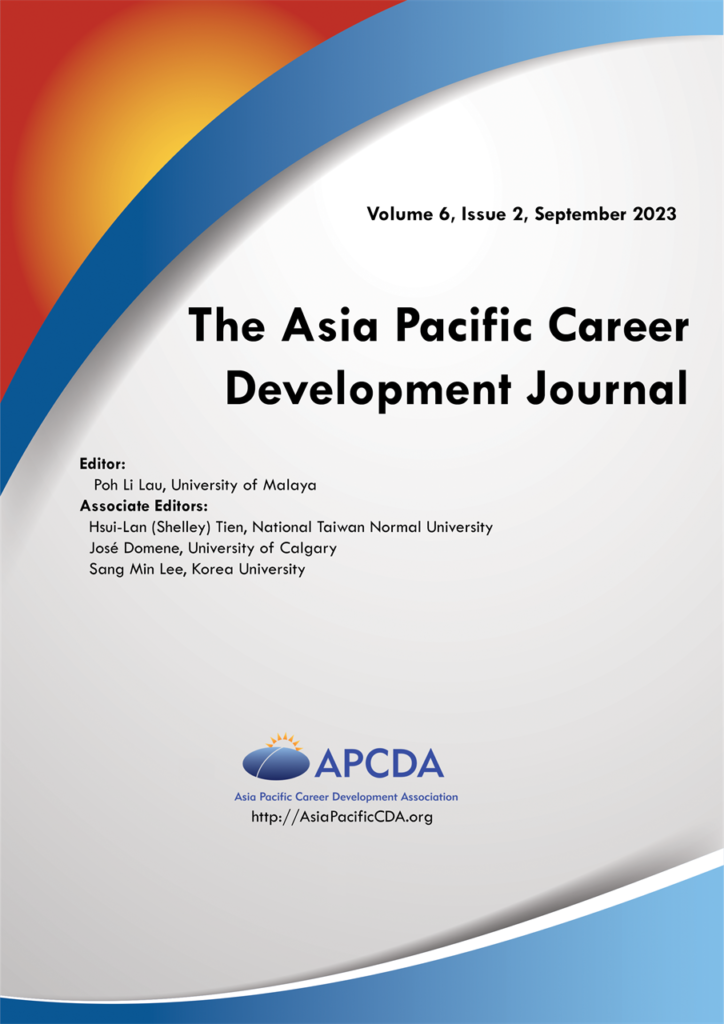The Asia Pacific Career Development Journal, Vol 6, No 2
Vol 6 No 2 (2023): September 2023 Issue
Published: 2023-06-17

Dr. Poh Li Lau welcomes you to the first edition of the APCD Journal for which she has served as its Editor.
Lead Article
Tomoko Adachi
Abstract: The current study aimed to examine the psychological mechanism of the gender division of labor. Study 1 assessed gender stereotypes for each male and female-dominated and gender-balanced occupation in terms of masculinity and femininity. Analyses of data from 652 Japanese college students, aged 18–24 years, demonstrated that occupations with high proportions of men and women were stereotyped as masculine and feminine, respectively. Study 2 analyzed data from 657 Japanese men and women, aged 20–60 years, and illustrated that men and women were more interested in the social and realistic domains, respectively. However, self-efficacy in realistic and social activities mediated realistic and social interests, respectively. Additionally, women’s interest in the realistic domain was influenced by self-efficacy in male-dominated fields. Lastly, the study discussed the practical implications for career education and support based on these findings.
Empirical Article 1
Fidan Korkut-Owen, Rabia Rümeysa Şeremet
Abstract: This investigation was a pilot study to assess the efficacy of an Online Career Development Program (OCDP) designed to reduce 9th grade Turkish students’ career indecisions. Based on a Career Indecision Inventory, 13 students (eight female, five male) who volunteered among the 9th grade students determined to have career indecision were included in the experimental group while 14 others (eight female, six male) were included in the control group. Participants in the experimental group were exposed to a six-week long psycho-educational OCDP designed to reduce career indecision. These one hour long weekly online sessions were based upon the Career Sailboat Model (see Figure 1). To evaluate the efficacy of the pilot program, the Career Decision Inventory, and a program evaluation form were utilized. It was determined in the quantitative findings that the program was effective in decreasing the career indecision of the participants of the experimental group. Supporting the quantitative findings, qualitative findings also indicate that the program may be effective.
Empirical Article 2
Candy T. Y. Ho
Abstract: The COVID-19 pandemic presented opportunities for higher education institutions to reimagine career services programs, at curricular and co-curricular levels, in order to better support students as they navigate new career possibilities and challenges. In response, a university senior career capstone course’s final class session was redesigned to encourage career adaptability for students. The class session incorporated components from traditional and contemporary career development theories: Super’s notion of Life-Roles; Savickas’ Career Construction Theory; Niles, Amundson, and Yoon’s Hope-Action Theory; and Schlossberg’s Transition Theory. Integrating theories into curriculum inspired a career constellation activity that enabled graduating students to draw connections between key life roles and events, and engage in group discussions and individual reflections to identify their immediate way(s) forward after undergraduate studies. Preliminary quantitative and qualitative data are shared, along with limitations and future directions for research and practice.
